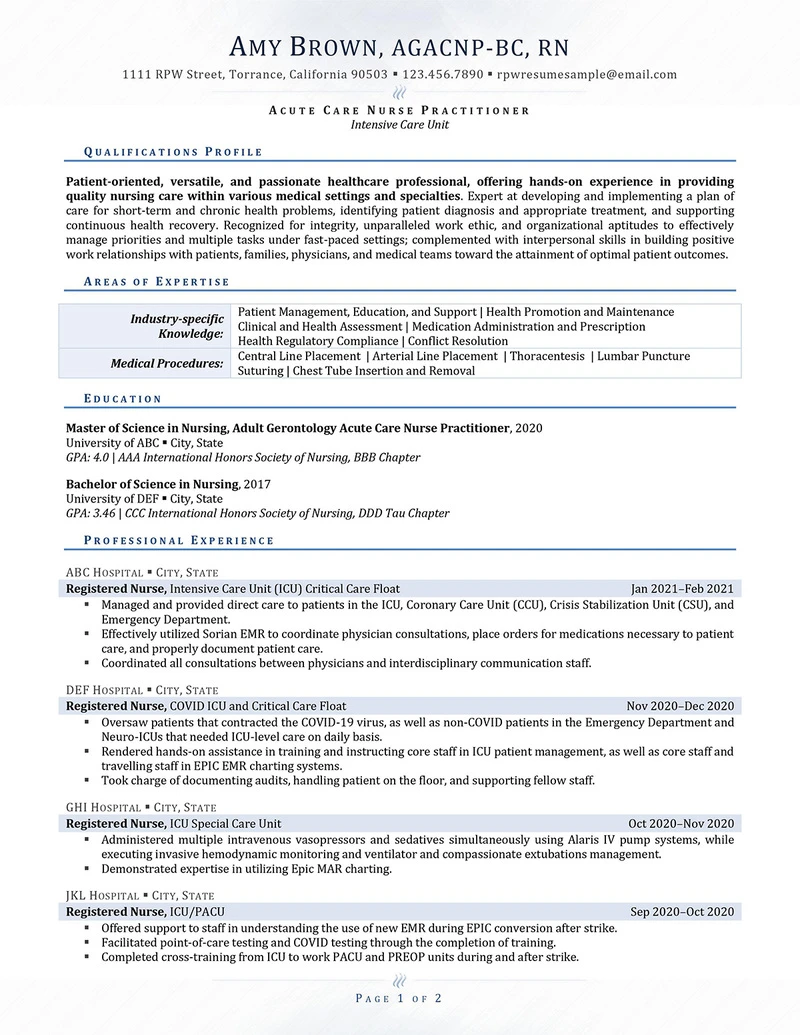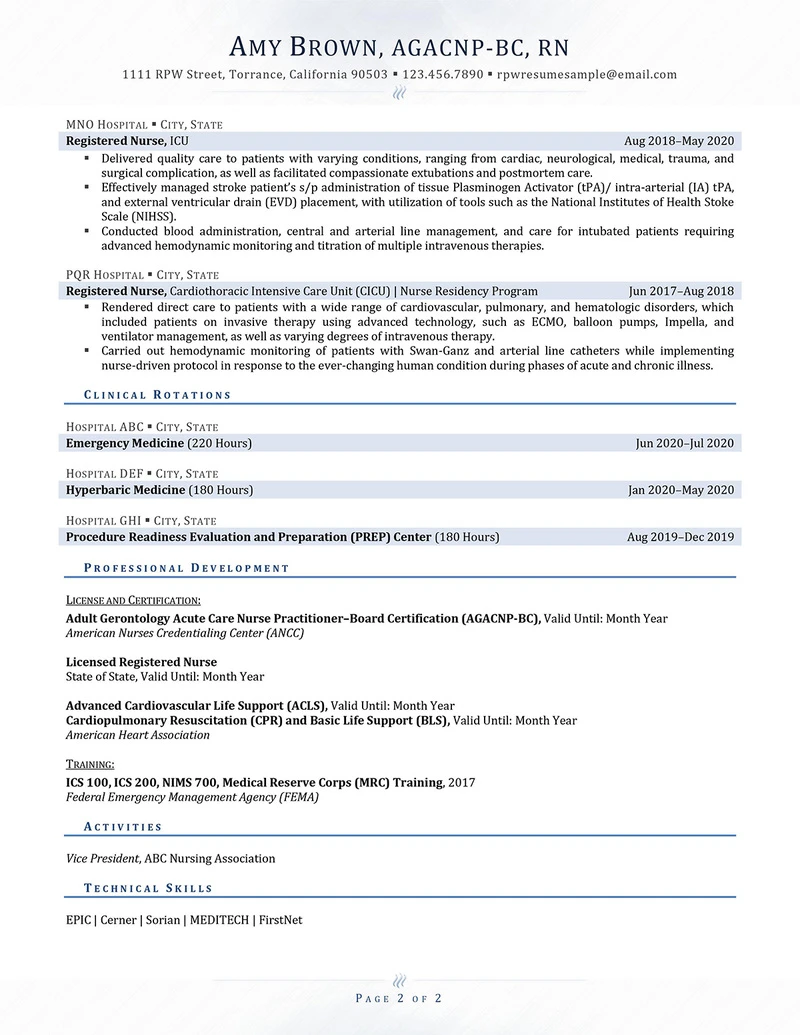As stated by the U.S. Bureau of Labor Statistics (BLS), the job outlook for a registered nurse (RN) shows considerable promise, with a projected growth of 9% from 2020 to 2030. This is about as fast as the common growth rate for all jobs. Hence, there’s a high chance that about 194,500 nursing jobs will open each year. This can then be mainly due to the need to replace workers who choose to change their careers or even retire. Furthermore, RNs can explore an opportunity of being someone working in intensive care units (ICUs), which can be the path you’re interested in taking.
Now that you know such data about this field, you’re aware of the fact that it has the possibility of being a competitive market in the long run. Hence, you need to take steps in ensuring your job application will stand out among others. With that, start with your ICU nurse resume.
This guide we created will help you learn more about your dream career and how you should write a strong ICU nurse resume toward landing your target job. Apart from that, you may also choose to seek expert help to customize your job search tools. Read on!
What is an ICU Nurse?
Also called critical care nurses, ICU nurses are RNs who work in ICUs. They are healthcare experts who aim to provide 24-hour care to patients who are critically ill or injured. While they share common duties and tasks with the other nursing roles, ICU nurses often have to perform under pressure and be able to adapt to constant changes in the nature of their work based on a patient’s status. Furthermore, there are also various types of ICUs they may work in, such as cardiac and surgical. This helps them become specialists in their certain field.

What are the Duties of an ICU Nurse?
Often, ICU nurses perform these various tasks:
- Be proactive in caring for patients
- Perform treatment procedures and nursing care
- Administer medications
- Use and maintain life support equipment
- Observe changes in the patient condition
- Update physicians about the patient status
- Prevent the spread of infections
- Ensure advanced life support
- Work closely with the medical team
- Serve as the main point of contact both with the patient and the patient’s family
How Do You Become an ICU Nurse?
If you aim to pursue this path, you need to complete a bachelor’s or associate’s degree in nursing. Then, pass the National Council Licensure Examination for registered nurses (NCLEX-RN). Once you’ve received your state license, you can now gain nursing experience. After quite some time, you can then choose to earn an ICU nurse certification based on the special types or areas of ICU nursing you want to take.
What to Include on Your ICU Nurse Resume
As an ICU nurse, you need to have the traits that help you become keen to details and careful when doing a certain task so as not to compromise patient safety. The same thing often applies to your job search as well, as you ensure your ICU nurse resume has all the right details and sections.
With that, use this foolproof checklist as you write a resume that’s effective, detailed, and tailored to the job you’re vying for:
Contact Details
Found at the topmost part of your resume, your contact details must include your full name in a larger font size so that it’s easy to read. Also, put your highest earned degree, licensure, and certification number. You may also opt to state your mailing address right below your name, along with your phone number and email address. Just make sure that the contact details you put here are updated.
A Catchy Intro
With many recruiters and hiring managers spending less than 10 seconds scanning resumes, you must put in the effort to ensure yours won’t make it to the reject pile. You can do this by catching your reader’s attention through your profile intro.
🔍 Think Your Resume’s Fine? Let’s Double-Check That
Even strong resumes can miss critical details—especially when it comes to passing Applicant Tracking Systems (ATS). Our specialists offer a free review to uncover gaps, improve formatting, and ensure your resume is ATS-ready and recruiter-friendly.
For this, you may choose from various formats based on your job level and career goals. This part aims to shed light on your main traits, skills, and feats. Hence, you can choose to write in one of these formats:
- Qualifications profile
- Resume Summary
- Resume Objective
Your Core Abilities
Just after your intro, add a section for your top areas of expertise, which would highlight your top hard and technical skills. This will help show recruiters that you have the needed skills for the ICU nurse job you’re aiming for.
Key Work History
One of the most vital parts of your ICU nurse resume is where you get to discuss yourself more as a professional healthcare worker.
This part must include your previous jobs, the names of your past employers and their locations, and the inclusive years of experience you had with them. Under each role, make sure to list your top tasks in bullet points. Make sure to state the ones that clearly define the kind of work you did in the past.
Academic Background
Often, earning your state license is required for you to land jobs. Hence, ensure your ICU nurse resume reflects your education. If you’ve earned a master’s degree, you must also use this part to highlight that.
Relevant Skill Sets
Like in any other job, there are certain skill sets that employers look for in ICU nurses. This is where you share yours to help you better present yourself as the right fit for the job.
To help you get started, you may check out these sample resume skills you can list on yours:
Soft skills
- Strong social skills
- Problem solving
- Empathy
- Teamwork
Hard skills
- Computer charting
- Patient/family education
- Pain management
- Care of drains/tubes
Technical skills
- CPAP machines
- CCU
- ER
- Triple lumen CVP
List of Your Other Credentials
This section may include your licenses and certifications. Since being an RN means passing the licensure exam, you must mention your state nursing license on your ICU nurse resume. Don’t forget to include your license number and the date you became a registered nurse or you last renewed. A sample of a certification you can list is Advanced Cardiovascular Life Support (ACLS).

How to Write Your ICU Nurse Resume
Now that you’re aware of the details you should include in your job search tool, it’s time to learn how to piece them together to form a strong resume. Heed these top factors to get you started.
1. Appropriate Resume Format
The right format to use may vary based on your job level and job search goals. Use this guide on the 3 most common formats to help you pick the most apt for you:
- Reverse chronological: Hence its name, you need to list your work history from your most recent job working your way backward. It’s best to use this type when you aim to maintain the same career path or want to show steady growth in your line of work.
- Functional: This highlights your skill sets as your major strengths. If you’re a career changer or you have employment gaps, opting for this choice helps make your work history more catchy to recruiters.
- Hybrid or Combination: Stressing both your work and skills, this format combines the first 2. For that reason, this may not be the best choice for those who have yet to gain job exposure and career feats.
- Targeted: A format aimed to highlight only all the relevant job experiences, while relegating all unrelated job posts under a separate subsection altogether.
2. On-Point Job Match
Being a keen ICU nurse must reflect on your resume. To do this, you must ensure that your job search tool befits the role you’re aiming to land. Make sure to review the job description and check if your background well matches what the job requires. This will help you avoid sending a generic resume for every role you want to apply for, and thereby not place yourself at risk of giving the impression that you’re not putting as much effort into your application as you should.
3. Ample Resume Keywords
As many firms use applicant tracking systems (ATS) to scan resumes, you must stay on top of the latest resume trends such as this. Make sure you’re using keywords that are found on the ICU nurse job posting—the needed skills and other required traits for the role.
4. Proper Layout
For the body and other normal text of your resume, make sure to use 12-point size, using font types that are easy to read. Moreover, put your headings and titles from 14 to 16 points in bold font for clear emphasis. Then, use at least a single space to give your resume enough whitespace. In addition, unless stated otherwise on the job posting, it’s best to save and submit your resume as a PDF file to keep the layout and format intact.
5. Final Checking
As a final step, ensure your file is free from typos and grammar errors so that you’re only left with a polished resume. Before sending out your job search tool, read the whole thing at least twice so that you can see what needs to be removed or edited. If it helps, you can have a peer, friend, colleague, or even family member do the checking for you. You can even ask for detailed feedback to further improve your work.
ICU Nurse Resume Example
Check out this sample ICU nurse resume we crafted so that you’ll have an idea how it should look like:


Let an Expert Craft Your ICU Nurse Resume
Don’t leave your job search to chance—stand out with a resume crafted by professionals who understand the specialized demands of nursing. Explore our nursing resume writing services and see how we can help you get hired faster and take the next step toward your dream nursing role.
Curious about our impact? Browse our healthcare resume examples and see how we empower clients with powerful, tailored resumes. If you already have a draft, get professional insights with our free resume review and receive valuable feedback from an experienced career coach.
And for even more job application tips, be sure to read our helpful blog post on writing a standout nursing cover letter. It’s packed with practical guidance to ensure your cover letter makes just as strong an impression as your resume.
Whether you need a complete resume overhaul or just expert advice, we make it easy to get started—contact us today and boost your job search with confidence!








